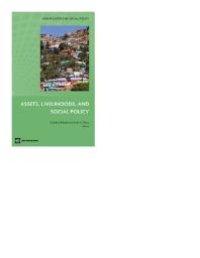
Ebook: Assets, Livelihoods, and Social Policy
Author: Caroline Moser, Anis A. Dani
- Tags: Saving and investment -- Developing countries -- Case studies., Structural adjustment (Economic policy) -- Developing countries -- Case studies., Developing countries -- Social policy -- Case studies., BUS068000, POL029000, SOC042000
- Series: New Frontiers of Social Policy Series
- Year: 2008
- Publisher: World Bank Publications
- City: Herndon, United States
- Edition: 1
- Language: English
- epub
Given the lack of adequate universal social welfare for those unable to find jobs in the salaried formal sector, the livelihoods and well-being of most poor people depends heavily on their asset base. This includes their ability to access and accumulate assets, obtain decent returns from these assets, and use their asset base to manage risks. Assets, Livelihoods, and Social Policy discusse the diverse strategies adopted by people in different contexts to accumulate assets through migration, housing investments, natural resources management, and informal businesses. An asset-based social policy can strengthen asset accumulation strategies as well as help the poor overcome the constraints of unfavorable institutional environments. To a considerable extent, asset accumulation strategies depend on the agency exercised by people themselves through individual or collective action. At the same time, the status of policies and institutions can enable or hinder these strategies and affect livelihood outcomes. In synthesis, the case studies lead to the differentiation among three different types of policies: policies that affect outcomes by directly influencing access to assets by the poorsuch as land, housing, natural resources, or credit. policies and public investments that change the nature of returns on assetssuch as investments in rural roads, agricultural inputs, and market development. policies that transform the value of assets held by the poor by virtue of administrative decisions that increase or reduce valuesuch as re-classification of land from arable or pasture to protected lands, land use regulations affecting resource use, or modification in regulations governing labor rights or migration.
Download the book Assets, Livelihoods, and Social Policy for free or read online
Continue reading on any device:

Last viewed books
Related books
{related-news}
Comments (0)